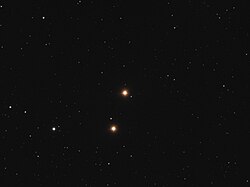Nu1 Coronae Borealis
| Observation data Epoch J2000.0 Equinox J2000.0 (ICRS) | |
|---|---|
| Constellation | Corona Borealis |
| Right ascension | 16h 22m 21.42283s[1] |
| Declination | +33° 47′ 56.5880″[1] |
| Apparent magnitude (V) | 5.20[2] |
| Characteristics | |
| Spectral type | M2 III[3] |
| B−V color index | 1.64[3] |
| Astrometry | |
| Radial velocity (Rv) | −13.01±0.12[1] km/s |
| Proper motion (μ) | RA: +4.756 mas/yr[1] Dec.: −38.223 mas/yr[1] |
| Parallax (π) | 5.0245 ± 0.0843 mas[1] |
| Distance | 650 ± 10 ly (199 ± 3 pc) |
| Absolute magnitude (MV) | −1.19[3] |
| Details[4] | |
| Radius | 80.78±2.88 R☉ |
| Luminosity | 1,257±70 L☉ |
| Temperature | 3,828 K |
| Other designations | |
| Database references | |
| SIMBAD | data |
Nu1 Coronae Borealis is a solitary,[6] red-hued star located in the northern constellation of Corona Borealis. It is faintly visible to the naked eye, having an apparent visual magnitude of 5.20.[2] Based upon an annual parallax shift of 5.02 mas,[1] it is located roughly 650 light years from the Sun. At its distance, the visual magnitude is diminished by an extinction of 0.1 due to interstellar dust.[7] This object is drifting closer with a radial velocity of −13 km/s.[1]
This is an evolved red giant star with a stellar classification of M2 III.[3] It is a variable star of uncertain type, showing a change in brightness with an amplitude of 0.0114 magnitude and a frequency of 0.22675 cycles per day, or 4.41 days/cycle.[8] It has about 81 times the Sun's radius and is radiating nearly 1,300 times the Sun's luminosity from its photosphere at an effective temperature of 3,828 K.[4]
References
- ^ a b c d e f g Brown, A. G. A.; et al. (Gaia collaboration) (August 2018). "Gaia Data Release 2: Summary of the contents and survey properties". Astronomy & Astrophysics. 616. A1. arXiv:1804.09365. Bibcode:2018A&A...616A...1G. doi:10.1051/0004-6361/201833051. Gaia DR2 record for this source at VizieR.
- ^ a b Ducati, J. R. (2002), "VizieR Online Data Catalog: Catalogue of Stellar Photometry in Johnson's 11-color system", CDS/ADC Collection of Electronic Catalogues, 2237, Bibcode:2002yCat.2237....0D.
- ^ a b c d Huang, W.; et al. (2012), "A catalogue of Paschen-line profiles in standard stars", Astronomy & Astrophysics, 547: A62, arXiv:1210.7893, Bibcode:2012A&A...547A..62H, doi:10.1051/0004-6361/201219804, S2CID 119286159.
- ^ a b van Belle, Gerard T.; von Braun, Kaspar; Ciardi, David R.; Pilyavsky, Genady; Buckingham, Ryan S.; Boden, Andrew F.; Clark, Catherine A.; Hartman, Zachary; van Belle, Gerald; Bucknew, William; Cole, Gary (2021-12-01). "Direct Measurements of Giant Star Effective Temperatures and Linear Radii: Calibration against Spectral Types and V - K Color". The Astrophysical Journal. 922 (2): 163. arXiv:2107.09205. Bibcode:2021ApJ...922..163V. doi:10.3847/1538-4357/ac1687. ISSN 0004-637X. Nu1 Coronae Borealis' database entry at VizieR.
- ^ "nu01 CrB". SIMBAD. Centre de données astronomiques de Strasbourg. Retrieved 2017-08-26.
{{cite web}}: CS1 maint: postscript (link) - ^ Eggleton, P. P.; Tokovinin, A. A. (September 2008), "A catalogue of multiplicity among bright stellar systems", Monthly Notices of the Royal Astronomical Society, 389 (2): 869–879, arXiv:0806.2878, Bibcode:2008MNRAS.389..869E, doi:10.1111/j.1365-2966.2008.13596.x, S2CID 14878976.
- ^ Famaey, B.; et al. (January 2005), "Local kinematics of K and M giants from CORAVEL/Hipparcos/Tycho-2 data. Revisiting the concept of superclusters", Astronomy and Astrophysics, 430 (1): 165–186, arXiv:astro-ph/0409579, Bibcode:2005A&A...430..165F, doi:10.1051/0004-6361:20041272, S2CID 17804304.
- ^ Koen, Chris; Eyer, Laurent (2002), "New periodic variables from the Hipparcos epoch photometry", Monthly Notices of the Royal Astronomical Society, 331 (1): 45–59, arXiv:astro-ph/0112194, Bibcode:2002MNRAS.331...45K, doi:10.1046/j.1365-8711.2002.05150.x, S2CID 10505995.

